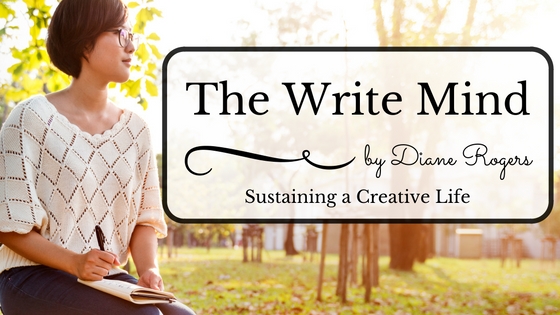by Dr. Diane Rogers
After months of floundering, my creative practice needed a complete overhaul. So, I followed my own advice in August and September by reviewing my literary purpose and reorganizing my priorities. The result? I arrived at my desk energized, recommitted, and ready to write beautiful words.
Then it happened.

Writer’s block? You’re not alone.
The specter of emptiness dropped in on me like the haunting face of a creepy clown. My phantomlike creative muse vanished into thin air leaving me staring at a blank screen with a brain full of wet cement.
Cue the pity party music.
To escape the shadow of desertion, I trolled Facebook and Googled everything. Several hours later, I had nothing to show for my time except a sore bottom. Scrolling through Pinterest didn’t provide me with a visual catalyst either. I sought sanctuary in my kitchen comfort zone and made myself a cup of tea. Did I think inspiration’s lightning bolt might hit me through the electric kettle?
Back at the computer, the empty page looked as pale and vacant as ever. As if I didn’t already feel deflated enough, my inner critic started yammering at me in voice that sounded like a snide Jerry Seinfeld. “And you call yourself a writer?” it chided.
I began to wonder what others do when a mental has them stumped, so I reached out to fellow OC Writers. Here’s what they said helps them move from fear to flow.
OC Writers to the Rescue
1. Change The Frame
Some OC Writers, like Gayle Carline, change the way they frame the term “writer’s block.” As a humor columnist for the Placentia News-Times and mystery author, Carline says she doesn’t experience writer’s block per se. She does, however, run up against what she calls “writer’s wavering” from time to time. It happens, she says, when she is undecided about which direction to take her stories.
2. Ask More Questions
To overcome any writing wobbles, Carline, who is also a wife, mother, and an avid horsewoman, reminds herself “that writing is re-writing, and that anything can be fixed during edits.” She finds it helpful to read what she has written up to that point. “Sometimes the next thing to write is suddenly clear to me,” she says. Carline also breaks through the blockage by getting up close and personal with the main character in her scene. She asks questions like, “What does the character want?” and “Is this the time to give it to them, or should I throw another obstacle in their path?”
3. Smack Someone
Like me, Carline says she hears her inner critic “a lot.” Unlike me, she rarely listens to it. However, a scene she was once writing bored her inner critic. “My character was investigating something at a country club, she was nosing around, asking questions and my inner critic was like, ‘blah blah blah, this is so boring.’ Carline then hit her character “in the head with a golf club.” Now, when her inner critic gets bored, she smacks one of her characters. “Certainly livens things up!” she says.
4. Walk Away
M.S. Alice calls herself “a geeky ball of sunshine who loves games, nerd culture, and making the people around me smile.” By day, Alice works in the video game industry. By night, she writes fantasy novels, short stories, song parodies, and poetry.
For Alice, writer’s block is a shapeshifting “beast” that appears in different forms according to the writing medium she uses. When she gets writer’s block for poetry, she says “it’s less because I can’t write anything and more because everything I write fails to convey the emotion that I want it to.” Alice’s way of slaying her blocky beast is to “walk away from the project or story” and return later “with a fresh mind.” She salvages what she can in a file on her computer for future inspiration.
5. Get Outside
When Alice’s creativity needs a boost, she finds it helpful to get outside. People watching in different places gets her juices flowing again. She rallies inspiration by sitting at Disneyland, the mall, the beach or even her local coffee shop, where she invents compelling stories for the families and individuals she sees. “Once I have one, more ideas tend to flood in,” Alice says.
6. Switch Gears
When historical novelist, blogger, and screenwriter, Herb Williams-Dalgart, author the award-winning of The French Girl’s War, feels “stuck,” he switches gears and dives into period and location research. Williams-Dalgart says he tends to let his story ideas “roll around” in his head during the week while he is at work. “By the time the time I get to the weekend I usually have a bunch of ideas ready to go. That helps a lot with avoiding writer’s block.” If he’s not sure where his story should go, Williams-Dalgart says, “I immerse myself in the details of my locations—smells, sounds, tastes, feelings… and motivate my characters from there.”
7. Get Older
Business woman, blogger, and memoirist, Karen Rutledge (known as “Boona” by her two grandkids) rarely experiences writer’s block. The secret to writing fearlessly, she says is “age.” Rutledge confesses, “I can’t imagine writing this freely and fearlessly 20 or 30 years ago.” On occasion, however, Rutledge finds she “censors” herself “in an effort to protect others or not offend” her audience. Having come to grips with the fact that she “has to write it all – the good, the bad and the ugly,” Rutledge now lets “the editing process decide what stays and what’s out.”
8. Check Your Attitude
Rather than describing issues with writer’s block, Herb Williams-Dalgart prefers to discuss his love of storytelling. He says the excitement he feels during the writing process leaves no room for fear. “I also give myself the freedom to change anything and everything if I think it’s not working. I’ve ditched dozens of pages, characters, and scenes over the years.”
So, it turns out writer’s block may be all in the attitude. After all, attitudes reflect our underlying beliefs, which are the hidden compass guiding each decision we make. To remove any obstacles, we have to examine the mindset we bring to the craft.
Williams-Dalgart advises, “If you approach writing with honesty and ruthlessness and give yourself the freedom to fly, there’s really nothing to fear.” Or, as award-winning author P.J. Colando says, “Writer’s block? What writer’s block?”
OC Writers, has writer’s block ever challenged you? How do you quash your inner critic? We want to know! Leave a comment below and share with others.
***

Dr. Diane Rogers, Author
After retiring from a corporate career in business transformation and change management, Dr. Diane Rogers brings her expertise in social psychology to classrooms and families.
Her first picture book, Stand Tall, made its debut at the 2008 Seeds of Compassion Conference in Seattle, Washington featuring His Holiness the 14th Dalai Lama. A week after the book’s release, the State of Washington selected Stand Tall as an official teaching resource for compassionate education. Diane’s other published works include Emerge, A Story of Confidence, and When We All Stand Tall. To find out more, visit www.drdianerogers.com.
A self-professed global nomad, when they aren’t traveling on or jumping out of planes, Diane and her husband Kevin triangulate between Sydney, Australia, Newport Beach, and their sailboat in the Mediterranean.
**O.C. Writers is a member of Amazon Associates. By clicking any of the book links on this site, the network earns a small commission from your purchase.




